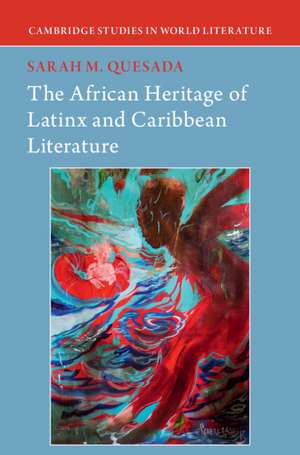The African Heritage of Latinx and Caribbean Literature: Cambridge Studies in World Literature
Autor Sarah M. Quesadaen Limba Engleză Hardback – 3 aug 2022
Preț: 530.11 lei
Preț vechi: 576.21 lei
-8% Nou
Puncte Express: 795
Preț estimativ în valută:
101.45€ • 105.52$ • 83.75£
101.45€ • 105.52$ • 83.75£
Carte disponibilă
Livrare economică 24 martie-07 aprilie
Livrare express 08-14 martie pentru 34.06 lei
Preluare comenzi: 021 569.72.76
Specificații
ISBN-13: 9781316514351
ISBN-10: 1316514358
Pagini: 302
Dimensiuni: 157 x 235 x 21 mm
Greutate: 0.54 kg
Ediția:Nouă
Editura: Cambridge University Press
Colecția Cambridge University Press
Seria Cambridge Studies in World Literature
Locul publicării:New York, United States
ISBN-10: 1316514358
Pagini: 302
Dimensiuni: 157 x 235 x 21 mm
Greutate: 0.54 kg
Ediția:Nouă
Editura: Cambridge University Press
Colecția Cambridge University Press
Seria Cambridge Studies in World Literature
Locul publicării:New York, United States
Cuprins
1. Fear: Junot Díaz's zombies and les contorsions extraordinaires in 'Monstro'; 2. Commodification: Badagry and the African safari of Achy Obejas's Ruins; 3. Obliteration: Gabriel García Márquez and his Angolan chronicles of a 'Latin-African' death foretold; 4. Archival distortion: The Chicano-Congo Relación of Tomás Rivera and Rudolfo Anaya.
Recenzii
'By rehabilitating and privileging the African archive in her account of Latinx/Caribbean relations, Sarah Quesada's book provides a fresh and very welcome instalment to debates about Pan-Africanism. But here, Pan-Africanism is more than just an aspirational political project, long distracted by the cynical pragmatism of political leaders. Rather, it is a work of re-animation that will redefine African and African diasporic relations through a well-grounded and nuanced humanities perspective. This book is a magnificent gift offering.' Ato Quayson, Stanford University
'Beautifully written, well researched and bold in its formulations, The African Heritage of Latinx and Caribbean Literature is an important intervention in the reading of Latinx and Latin American literature, widely defined. The brilliance of the book is manifest in the analysis, in which the Sarah Quesada unearths discreet connections to Africa and unfolds them into an ambitious and successful re-cartography of the Atlantic through a Latin America-Africa axis that is very persuasive and unique.' Ignacio Sanchez Prado, Washington University in St. Louis
'Sarah Quesada has written a BIG book, both in its scholarly import and geographic scope. Quesada finally centers Africa in study of the Black Atlantic. She also redresses its exclusion of Latin America - a region that received three-quarters of enslaved Africans during the colonial period - while making plain why Latinx literature has always been a world literature. Reading comparatively and with laser focus across four languages, dozens of colonial archives, and three continents, Quesada traces the textual memory and political internationalism that has thrived for over eighty years among authors and political actors from the US Southwest, the Dominican Republic, Haiti, Cuba, Colombia, and Benin, Nigeria, Senegal, and the Democratic Republic of Congo. Quesada presents the reader with the beating nexus of cultural, political, and aesthetic Latin-Africa, in vivid and engaging prose, such as only a generational thinker can accomplish. Afrolatinidad is redefined in her capable hands.' María Josefina Saldaña-Portillo, New York University
'Quesada's The African Heritage of Latinx and Caribbean Literature transforms Paul Gilroy's notion of The Black Atlantic into an Afro-Latino Atlantic…Quesada is able to make a hopeful argument for the possibility of fiction - whether traditional print novels or heritage site oral storytelling - to helpfully respond to and potentially transform the path wrought by this real and symbolic violence.' Tom McEnaney, University of California, Berkeley
'Beautifully written, well researched and bold in its formulations, The African Heritage of Latinx and Caribbean Literature is an important intervention in the reading of Latinx and Latin American literature, widely defined. The brilliance of the book is manifest in the analysis, in which the Sarah Quesada unearths discreet connections to Africa and unfolds them into an ambitious and successful re-cartography of the Atlantic through a Latin America-Africa axis that is very persuasive and unique.' Ignacio Sanchez Prado, Washington University in St. Louis
'Sarah Quesada has written a BIG book, both in its scholarly import and geographic scope. Quesada finally centers Africa in study of the Black Atlantic. She also redresses its exclusion of Latin America - a region that received three-quarters of enslaved Africans during the colonial period - while making plain why Latinx literature has always been a world literature. Reading comparatively and with laser focus across four languages, dozens of colonial archives, and three continents, Quesada traces the textual memory and political internationalism that has thrived for over eighty years among authors and political actors from the US Southwest, the Dominican Republic, Haiti, Cuba, Colombia, and Benin, Nigeria, Senegal, and the Democratic Republic of Congo. Quesada presents the reader with the beating nexus of cultural, political, and aesthetic Latin-Africa, in vivid and engaging prose, such as only a generational thinker can accomplish. Afrolatinidad is redefined in her capable hands.' María Josefina Saldaña-Portillo, New York University
'Quesada's The African Heritage of Latinx and Caribbean Literature transforms Paul Gilroy's notion of The Black Atlantic into an Afro-Latino Atlantic…Quesada is able to make a hopeful argument for the possibility of fiction - whether traditional print novels or heritage site oral storytelling - to helpfully respond to and potentially transform the path wrought by this real and symbolic violence.' Tom McEnaney, University of California, Berkeley
Notă biografică
Descriere
Interweaving the influential voices of African, Caribbean, and Latinx authors, this book challenges eurocentric notions of World Literature.






